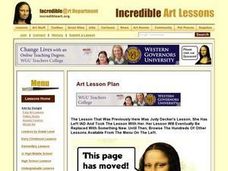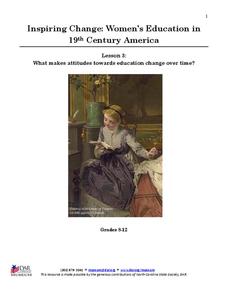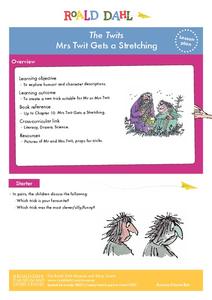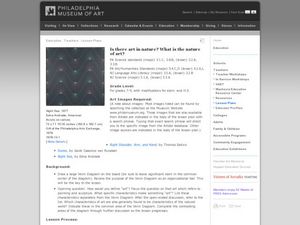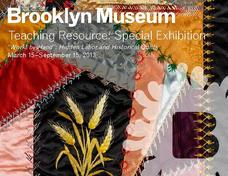Curated OER
Lesson: Text Messages
Can a neon sign be considered art? Kids consider two different works that use neon text as the basis for conveying artistic social messages. They then analyze a truism from Jenny Holzer's web site that holds meaning to them personally....
Roald Dahl
Matilda - Arithmetic
Mr. Wormwood, one of the characters in Roald Dahl's Matilda, is not the most trustworthy of characters. Have student groups take on the roles of car salespeople and play a game to see who can make the most profit by selling...
Roald Dahl
Matilda - The Platinum-Blond Man
Before reading Chapter Six, "The Platinum-Blond Man" in Matilda, readers preview the illustration of Mrs. Wormwood dropping her plate of food, and think about what may have happened to cause the scene. After reading the chapter, class...
Roald Dahl
Matilda - The Weekly Test
Readers take the main characters in Matilda and individually describe them through a mnemonic. To get there, group members create an acrostic poem describing the character they were given, and choose one of the words from the...
Roald Dahl
Matilda - Miss Trunchbull
How would you react to the Trunchbull if she was your teacher? This is the focus of an activity that has readers imagining and then acting out their reactions to various Trunchball scenarios in the story.
Roald Dahl
Matilda - The First Miracle
As the story unfolds, readers discover Matilda has a superpower. Take part in an activity that has learners talking about what superpower they would have, how they would use it, and how it could help others. Then, after reading the...
Roald Dahl
Matilda - Throwing the Hammer
Full truth, or an exaggeration? How can you tell when a storyteller is exaggerating a story? Readers analyze a story told by Hortensia, and identify the exaggerative language she uses. Then, learners write their own narrative story using...
Roald Dahl
Matilda - The Reader of Books
The titular Matilda from Roald Dahl's famous novel adored books above all things. Discuss why it is important to read stories from across cultures and around the world using the first chapter from the ever-loved story Matilda.
Curated OER
African Ceramic Portrait Vessel
Middle schoolers create a piece of art inspired by traditional African pieces.
National Gallery of Art
Islamic Art and Culture
Provided by the National Gallery of Art in Washington, this resource for teachers examines Islamic art, including calligraphy, arabesques, and geometric designs. A recounting of the spread of the faith and the tumultuous political...
Roald Dahl
Matilda - Bruce Bogtrotter and the Cake
After reading the 11th chapter in Matilda, class members take on the role of Bruce Bogtrotter and re-enact the cake eating scene. Here's the catch: they must come-up with an impromptu re-enactment of the scene from the story, and...
National Society Daughters of the American Revolution
Lesson 3: What Makes Attitudes Towards Education Change over Time?
The struggle for women's rights is not unique to this generation, or even to the 20th century. Class members explore the conflicting opinions of Alexander Graham Bell and his wife, Mabel Hubbard Bell, regarding women's pursuits of higher...
Roald Dahl
The Twits - The House, the Tree and the Monkey Cage
A house with no windows and a garden full of stinging nettles make the perfect home for Mr. and Mrs. Twit. The seventh lesson in an 11-part unit designed to accompany The Twits by Roald Dahl takes a closer look at the Twits' home...
Roald Dahl
The Twits - Muggle-Wump Has an Idea
If a bar of chocolate was on the floor, would you try to pick it up? What if it was covered with glue? The eighth lesson in an 11-part unit designed to accompany The Twits by Roald Dahl has scholars imagine crazy scenarios. The...
Roald Dahl
The Twits - Mrs Twit Gets a Stretching
A cork, a rubber snake, and a bucket of mud may not seem like the best materials for washing a car, but they are in The Twits. The fifth lesson in an 11-part unit designed to accompany The Twits by Roald Dahl has readers role play...
Roald Dahl
The Twits - Mrs Twit
"A person who has good thoughts cannot ever be ugly." The second instructional activity in an 11-part unit that accompanies The Twits by Roald Dahl uses poetry to encourage positive character traits. Mrs. Twit has ugly...
Roald Dahl
The Twits - Dirty Beards
The problem with beards is that they collect a lot of food. The first lesson in an 11-part unit related to The Twits by Roald Dahl explores the hairy jungle that is Mr. Twit's beard. A concluding project has learners create their own...
Roald Dahl
The Twits - The Wormy Spaghetti
What do spiders' legs and an octopus's eyeball have to do with metaphors? The fourth lesson in an 11-part unit designed to accompany The Twits by Roald Dahl uses disgusting foods to teach about metaphoric writing.
Curated OER
Science NetLinks: Hollywood Dinosaurs
Students use relevant evidence and logical reasoning to construct theories for dinosaur behavior. They examine recent evidence that challenges a prevailing dinosaur theory.
Curated OER
Woodlands Ribbonwork
Learners make art based on the ribbon work of the Woodland Indians. Background information on the art form and procedure are laid out in an easy to follow step-by-step format.
J. Paul Getty Trust
Still-Life Painting: Arranging Nature—Lesson 1
Art learners examine still-life arrangement images and respond to a series of prompts. In a whole-class discussion, pupils list elements and qualities that still-life paintings can have. After instructors create an arrangement and model...
Curated OER
Descriptive Writing: Using Art to Inspire description
Write with the senses! Try using art to inspire writers to consider all of the senses. Here, the class is divided in half. Each group looks at one of two images, imagines the senses that would be engaged, and records answers to five...
Philadelphia Museum of Art
Is There Art in Nature? What Is The Nature of Art?
It's always great to find cross-curricular lessons, especially when they integrate two very interesting topics. Learners will consider three paintings as they relate to both science and art. They'll discuss each piece and then respond to...
Brooklyn Museum
"Workt by Hand": Hidden Labor and Historical Quilts
Just like a painting or the symbols on a flag, quilts can express ideas that reflect a cultural context, space, and time. The class discusses the history of quilt making throughout US history and what different types of quilts mean. They...
Other popular searches
- Museums and Exhibits
- History of Science Museums
- Online Museums
- History Museums
- Children's Museums
- Science Museums
- Childrens Museums
- Art Museums
- Museum Directories
- +Childrens +Museum
- On Line Museums
- Museums of History








